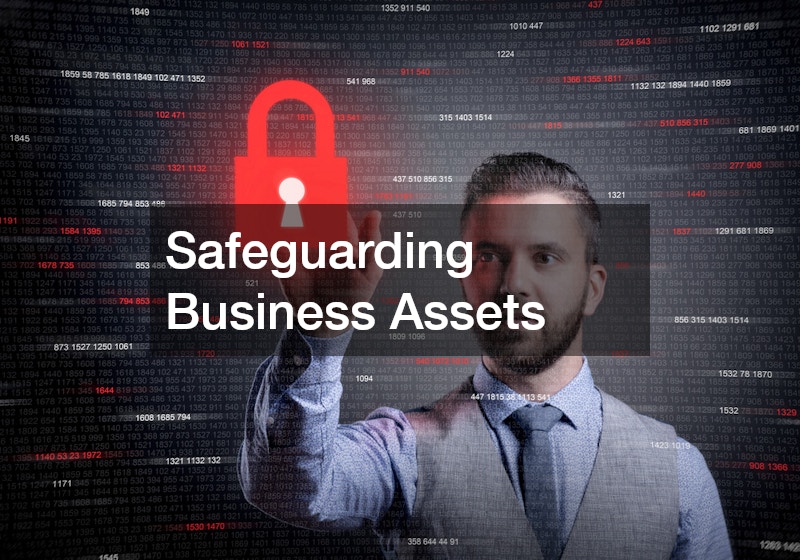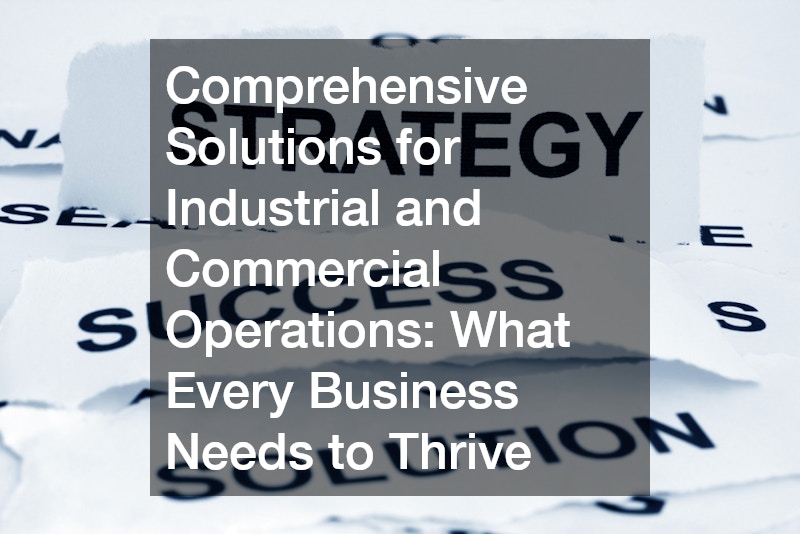In the fast-paced world of industrial and commercial operations, effective business management is crucial. Solutions that integrate operational efficiency, safety, and sustainability are vital for keeping pace with industry demands and innovations. Businesses that can successfully combine these elements often find themselves at the forefront of their respective fields.
Bolstering a business’s capacity without compromising on safety and environmental responsibility lays a strong foundation for success. Through a seamless blend of efficient management practices and sustainable initiatives, organizations can not only meet current demands but also future-proof their operations. This article explores how such comprehensive solutions contribute to thriving commercial ecosystems.
We will delve into various facets of business management, from optimizing waste management, maintaining robust safety systems, and ensuring structural integrity to fostering strong business relationships. By understanding and implementing these core areas, businesses can enhance productivity while remaining committed to environmentally conscious practices.
Ensuring Operational Efficiency

Optimizing Waste Management
Effective waste management is fundamental to effective business management, pivotal in maintaining a clean and efficient operational environment. By utilizing local dumpster rentals tailored to specific industry needs, businesses can significantly optimize waste disposal processes. This not only keeps operations smooth but aligns with broader environmental goals.
Custom waste management solutions cater to diverse industries, ensuring compliance with waste disposal regulations and enhancing operational efficiency. The role of service providers in offering flexible, eco-friendly disposal options cannot be overstated. Such measures allow businesses to focus on core operations while minimizing their ecological footprint.
Examples abound of companies increasing eco-friendliness through integrated waste solutions. Whether reducing landfill contributions or enhancing recycling initiatives, these efforts are part of a larger trend toward sustainable business practices. Effective management of waste directly impacts operational continuity and business reputation.
Efficient Facility Management
A well-organized warehouse facility is a hallmark of efficient operations and effective business management. Strategic layout planning and storage optimization are fundamental aspects that streamline business processes and mitigate risks. Ensuring operational safety through these measures enhances productivity and minimizes costly disruptions.
Adopting best practices in warehouse management contributes significantly to the overall efficiency of a business. Elements such as inventory control, ergonomic handling systems, and automated processes play crucial roles. Operations flow seamlessly when supported by reliable maintenance and logistics, driving efficiencies at every level.
Reliable logistics support is a key differentiator in maintaining high operational standards. Quick response times and effective resource management are crucial for minimizing downtime and optimizing workplace resources. These components underscore the importance of structured facility management in competitive market landscapes.
Fleet Maintenance for Business Continuity
Fleet maintenance forms a backbone of logistics and transportation-heavy operations, integral to effective business management. Regular maintenance checks and fleet assessments are essential to prevent breakdowns and ensure timely deliveries. The cost of neglect is high, both in terms of financial loss and business credibility.
Proactive maintenance strategies result in remarkable savings on repair costs and downtime, emphasizing their worth. Businesses that implement thorough fleet maintenance protocols are better equipped to handle the demands of logistics-heavy environments. As a result, they maintain a significant competitive edge.
By investing in robust fleet maintenance practices, companies not only safeguard against unexpected outages but also secure efficient delivery schedules. The impact on customer satisfaction and business reputation cannot be overstated, underscoring the critical role of this aspect of business management.
Enhancing Workplace Safety

The Role of Safety Systems
An effective fall protection system is indispensable in industrial environments and crucial to both employee safety and compliance. Implementing safety measures not only reduces accident rates but also boosts worker morale by demonstrating a commitment to their well-being. Safety systems thus form a core component of effective business management by ensuring a stable and secure working environment.
Compliance with industry-specific safety standards positively impacts an organization’s reputation. Clients and partners are more likely to trust businesses that prioritize safety, which can translate into operational benefits. Ensuring workplace safety is not merely an obligation but a strategic necessity for sustainable growth.
Proper safety systems signify a commitment to best practices and regulatory adherence. Such systems not only fulfill legal obligations but also reflect a business culture that values employee welfare. Long-term benefits include enhanced employee productivity and lower liability issues.
Industrial Insulation for Employee Safety
An industrial insulation company plays a significant role in protecting workers from extreme temperatures. These insulation solutions are integral to maintaining worker safety and reducing energy consumption, forming a bridge between workplace safety and efficiency. Proper insulation is a dual investment in employee well-being and environmental responsibility.
The energy efficiency of industrial environments sees marked improvements through sound insulation practices, aligning with broader sustainability initiatives. This alignment not only fulfills environmental commitments but results in significant operational savings. By investing in such measures, businesses demonstrate comprehensive problem-solving capabilities.
Applications of industrial insulation are diverse, contributing to safer and more sustainable industrial facilities. Facilities that embrace these practices enhance their operational worth while securing employee protection. These measures underscore a commitment to effective business management through strategic resource utilization.
Customized Workwear for Protection and Branding
Custom workwear serves multiple roles, from ensuring employee safety to projecting a professional image. Effective business management involves choosing workwear that meets industry safety standards while supporting corporate identity. Workers feel valued and protected, positively influencing workplace morale.
Custom workwear is an extension of branding efforts, reinforcing the image of competence and reliability. Design, fabric choice, and functionality are all driving factors in creating effective custom solutions. Successful businesses understand the impact of thoughtfully designed workwear on operational safety and brand perception.
In selecting custom workwear, businesses must prioritize both practical and aesthetic aspects. Materials should withstand operational environments, and designs should reflect corporate values. This approach ensures that workwear meets safety requirements while supporting broader business objectives.
Safeguarding Business Assets

Estate Planning for Long-Term Security
Estate planning is a cornerstone of financial security and business continuity. Through thoughtful estate planning, businesses ensure that their assets are protected during generational transitions. This foresight is integral to effective business management and long-term corporate health.
A proactive approach to estate planning can prevent common pitfalls that compromise business integrity and family harmony. Businesses should engage with knowledgeable estate planners to develop robust strategies for seamless transitions. Such measures contribute to sustained business growth and stability beyond the current leadership.
Effective estate planning involves strategic decision-making to safeguard business assets. Avoiding common errors in this domain requires thorough understanding and preparedness. As part of a comprehensive management strategy, it supports organizational resilience and longevity.
Securing Property Boundaries
Commercial fence installation enhances property security and defines clear operational boundaries. Protecting business assets through controlled access and physical barriers underscores the importance of effective business management. Such installations contribute to both asset protection and operational efficiency.
Businesses across various industries benefit from tailored fencing solutions, reflecting their specific security needs. Apart from providing physical security, these installations represent forethought in asset management. They are essential in mitigating risks associated with unauthorized access or breaches.
Commercial fences serve a strategic purpose, significantly impacting both the security and aesthetics of business premises. Their installation requires consideration of operational demands and industry standards. Tailored solutions ensure that security infrastructure aligns with business goals and operational needs.
Supporting Business-Specific Operations
Specialized Equipment for Industry Needs
Commercial kitchen equipment is critical for operations in the food and hospitality sector, defining standards for safety and productivity. Choosing the right equipment ensures that operational demands are met while maintaining compliance with safety protocols. Effective business management in this context involves investing in durable, high-quality equipment.
Specialized tools and equipment enhance productivity by reducing the time and effort required for specific tasks. When businesses prioritize quality in their equipment selections, they reinforce operational standards and safety measures. This foresight aids in delivering consistent service and maintaining customer satisfaction.
Guidance from industry professionals can assist businesses in selecting appropriate commercial kitchen equipment. Quality equipment supports both operational efficiency and compliance with relevant standards. Businesses should evaluate their operational processes and choose equipment that aligns with their specific industry needs.
Roofing Solutions for Structural Integrity
Commercial roofers play a vital role in maintaining the structural integrity of business facilities. Regular inspections and timely repairs prevent damage or costly interruptions in operations. Effective business management includes investing in quality roofing solutions for long-term facility sustainability.
Scheduled inspections are crucial to identifying potential issues and mitigating risks. Roof maintenance is an aspect of facilities management that, when executed effectively, safeguards both physical assets and operational continuity. Sound roofing practices contribute significantly to overall business efficiency.
Energy-efficient roofing options are increasingly adopted for their long-term economic and environmental benefits. These installations reduce energy consumption, offering operational savings and reducing the carbon footprint. Businesses demonstrate foresight by integrating such sustainable solutions into their management strategies.
Efficient Dumpster Solutions for Commercial Spaces
Local dumpster rental offers efficient solutions for waste disposal across various commercial sectors. Construction, food service, and retail industries benefit from tailored dumpster solutions that align with operational needs. Effective business management ensures that waste is managed sustainably and complies with industry regulations.
Cost savings are a significant advantage offered by efficiently managed dumpster rental plans. The right disposal practices streamline operations, improving both financial and environmental outcomes. Sustainable waste management is a testament to a business’s commitment to environmental stewardship and operational proficiency.
Dumpsters facilitate adherence to sustainability initiatives, reinforcing a business’s green credentials. Properly managed disposal processes reflect a broader strategic approach to waste management. By investing in tailored solutions, businesses ensure compliance while enhancing operational efficiency.
Driving Sustainability in Operations

Energy Efficiency in Insulation and Equipment
Industrial insulation is pivotal in reducing energy consumption, directly supporting sustainability and operational cost-efficiency. An industrial insulation company can significantly contribute to designing effective energy-saving solutions. Such strategies underscore the confluence of effective business management and sustainable practices.
Energy-efficient commercial equipment not only saves on operational costs but also reduces the carbon footprint. Businesses that prioritize sustainable equipment choices reinforce their commitment to environmentally responsible management. The benefits extend beyond immediate cost savings to encompass long-term environmental impact.
The adoption of energy-efficient solutions requires businesses to evaluate and implement cutting-edge insulation and equipment strategies. This proactive approach not only aligns with sustainability goals but also enhances operational viability. These elements are indicative of forward-thinking business management practices.
Sustainable Waste Management
Organized waste management is essential in reducing contributions to landfills and achieving sustainable business goals. Effective business management integrates comprehensive waste-handling strategies to meet environmental standards. Companies can significantly enhance their recycling practices, especially through partnerships with local dumpster rental providers.
Improving recycling processes requires strategic infrastructure investments and partnerships. These investments reduce operational waste, contributing to financial savings and sustainability efforts. The result is a business culture that prioritizes both economic and environmental strategies.
Dumpster rental services play a crucial role in facilitating efficient waste management strategies. By aligning disposal processes with sustainability goals, businesses can optimize waste management for environmental and operational benefits. This alignment is a testament to comprehensive and effective business management.
Future-Proofing Industrial Facilities
Integrating eco-friendly practices in business operations enhances the value of industrial properties. Effective management involves forward-looking strategies that anticipate and incorporate sustainability changes. This not only elevates the facility’s worth but also prepares the business for evolving regulatory landscapes.
Long-term strategic planning for sustainability secures both current operational efficiency and future business stability. Practices that focus on sustainable development strengthen a business’s core operations and public reputation. Such measures are critical for organizations aiming at long-term viability and success.
Businesses that align operations with sustainable practices stand to gain both economically and socially. Implementing ecologically responsible measures speaks to a company’s commitment to holistic business management. This results in facilities that are both operationally efficient and environmentally conscious.
Building Strong Business Relationships

The Importance of Trusted Service Providers
Partnering with reliable companies for essential services such as fencing, roofing, and equipment rental highlights the importance of effective business management. Trusted service providers ensure consistency in service and quality, fostering backbone stability for business operations. This partnership approach aids in sustaining long-term business growth.
Vetting and selecting the right vendors is crucial for aligning service quality with business needs. Businesses should assess potential partners based on their track record, reliability, and alignment with operational objectives. Effective vendor management significantly impacts the seamlessness and success of business operations.
The choice of service providers can define the quality and reliability of a business’s operations. Establishing robust partnerships ensures access to essential services aligned with strategic goals. This proactive engagement is key to sustaining efficient and reliable business processes.
Collaboration with Specialists
Collaboration with specialists, including estate planners and safety consultants, adds depth to business operations. These partnerships allow businesses to tap into expertise that can strengthen their operational strategies. By leveraging specialist knowledge, businesses can achieve more consistent and impactful results.
Specialists bring a level of expertise that enhances a business’s ability to navigate complex domains effectively. Long-term partnerships with specialists foster mutual understanding, leading to smoother collaboration and better outcomes. This relationship exemplifies the strategic nature of effective business management.
Businesses that invest in collaboration with external experts harness valuable insights and resources. These partnerships result in refined strategies that contribute to operational efficiency and risk management. Such collaborations are indicative of a robust management approach prioritizing excellence and innovation.
Conclusion
The role of comprehensive solutions within effective business management is evident through their impact on scaling and sustaining industrial and commercial operations. By integrating safety, efficiency, and sustainability, businesses create resilient frameworks that support long-term success. This commitment to a holistic approach is vital for navigating the complexities of modern commerce.
Organizations are urged to prioritize their operational focus on these core areas, recognizing the expertise available through strategic partnerships and specialized services. Effective business management stems from understanding these dynamics and integrating them into daily operations. Such commitments are foundational to building enduring business success.
As a call to action, businesses are encouraged to evaluate their current processes and explore professional solutions to address operational gaps. By proactively seeking areas for improvement and engaging industry experts, organizations can ensure their operations remain both effective and sustainable. This proactive stance empowers businesses to thrive in constantly evolving markets.
